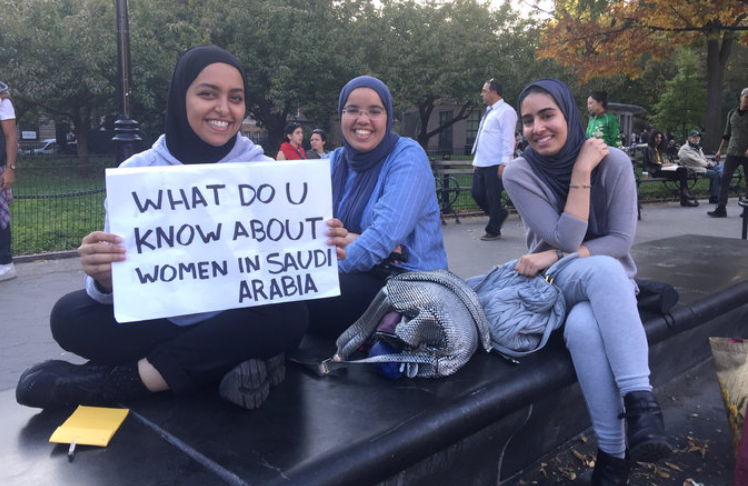Image by the writer: Soon after “Ladies First” was screened, I met these Saudi students in Washington Square Park in New York. Hend, on the left, had watched the documentary and criticized it for portraying her country as a place that oppresses women. “We don’t need to abolish male guardianship,” she said. “We need to teach men how to be better guardians.” Credit Mona El-Naggar/The New York Times.
By MONA EL-NAGGAROCT.
“We’re not allowed to even go to the supermarket without permission or a companion, and that’s a simple thing on the huge, horrendous list of rules we have to follow.” — DOTOPS, 24
“The male guardianship makes my life like a hell!! We want to hang out with our friends, go and have lunch outside. I feel hopeless.” — JUJU19, 21
“I don’t mind taking my dad’s approval in things he should be a part of. These very strong social bonds you will never, ever understand.” — NOURA
These are three of the nearly 6,000 women from Saudi Arabia who wrote to The New York Times last week about their lives.
Continue reading the main story
See Video here ‘Ladies First’: Saudi Arabia’s Female Candidates
By MONA EL-NAGGAR and ADAM BOLT
We had put a call-out on our website and on Twitter in conjunction with the publication of “Ladies First,” a Times documentary I directed about the first Saudi elections in which women were allowed to vote and run for local office.
Saudi Arabia is an incredibly private, patriarchal society. While I was making the film, many women were afraid to share their stories for fear of backlash from the male relatives who oversee all aspects of their lives as so-called guardians. We wanted to hear more about their fears, their frustrations, their ambitions.
Saudi Arabia has one of the world’s highest rates of Twitter use, and our posts rocketed around. We were overwhelmed by the outpouring.
Most of the responses focused on frustration over guardianship rules that force women to get permission from a male relative — a husband, father, brother or even son — to do things like attend college, travel abroad, marry the partner of their choice or seek medical attention. Some women talked about the pride they had in their culture and expressed great distrust of outsiders. But many of them shared a deep desire for change and echoed Juju19’s hopelessness.
Soon after “Ladies First” was screened, I met these Saudi students in Washington Square Park in New York. Hend, on the left, had watched the documentary and criticized it for portraying her country as a place that oppresses women. “We don’t need to abolish male guardianship,” she said. “We need to teach men how to be better guardians.” Credit Mona El-Naggar/The New York Times
There was an angry backlash under a Twitter hashtag using Arabic for “Don’t tell The New York Times.” And there was a backlash to the backlash: “#don’t_tell_theNewYork_times that if your father rapes you and you run away, then you will go to prison, and if they let you out, then they will send you back to him.”
Excerpts from the women’s responses are below, many translated from Arabic. In order to enable women to feel free to speak openly, we gave them the option of anonymity. Where possible, we verified the identity of the respondent or location of her email. In some cases, that proved impossible.
We want to keep the conversation going. Feel free to email us at [email protected].
A Life Restricted
“I got into an accident once in a taxi, and the ambulance refused to take me to the hospital until my male guardian arrived. I had lost a lot of blood. If he didn’t arrive that minute, I would’ve been dead by now.” — RULAA, 19
“Every time I want to travel, I have to tell my teenage son to allow me.”
— SARAH, 42
a doctor in Riyadh
“My sister went to a bookstore without taking permission from her husband, and when she returned, he beat her up without restraint.”
— AL QAHTANIYA, 28
“The door of the school where I work is closed from early morning till noon. There is a man guarding the door. Even if a teacher is done with her classes, she cannot leave. Metal gates keep us as prisoners.” — MALAK, 44
“I left the home and sought refuge with a human rights organization in Saudi. I told them about my problems with my father, and they were not able to do anything, and they advised me to go to the police to demand protection from my father. When I went to the police, my father had already informed them that I fled his home. I told the police everything, and they said that I did something wrong/committed a horrible crime in leaving the home of my father, and they placed me in prison!
“The first three days I spent in solitary, then they transferred me to the general ward. There were women there who committed crimes like killing and stealing.” — TYPICAL SAUDI GIRL, 23
